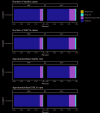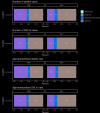Primary liver cancer disease burden in Cambodia during 1990-2021: a systematic analysis of datasets from the global burden of disease study 2021
- PMID: 40596871
- PMCID: PMC12211234
- DOI: 10.1186/s12876-025-04077-6
Primary liver cancer disease burden in Cambodia during 1990-2021: a systematic analysis of datasets from the global burden of disease study 2021
Abstract
Background: The etiological composition and disease burden of hepatocellular carcinoma (HCC) in Cambodia show significant dynamic changes, and targeted prevention and control strategies are urgently needed.
Methods: First, this study obtained data on HCC by age, sex, etiology, incidence, prevalence, deaths, disability-adjusted life years (DALYs), and attributable risk from the 2021 GBD study focused on Cambodia data from 1990 to 2021. Secondly, the study also examined the temporal trend of subtype-specific HCC disease burden in Cambodia from 1990 to 2021 using linear regression modeling to calculate estimated annual percentage change (EAPC) values. Finally, risk factors for HCC of different etiologies were also analyzed.
Results: Although the age-standardized rate (ASR) of HBV, HCV and NAFLD-related HCC showed a downward trend, the total number of cases and the number of deaths continued to increase. The ASR of HCC related to alcoholic liver disease rose against the trend. The burden of HBV and HCC related to alcoholic liver disease is significantly heavier in men, while the burden of HCC related to HCV and NAFLD is more severe in women. Viral hepatitis (HBV/HCV) remains the main cause of liver cancer in Cambodia, but the contribution of metabolic causes (NAFLD) continues to rise.
Conclusion: HCC poses a significant threat to the health of Cambodians. This study provides key data support for Cambodia to formulate a comprehensive prevention and control strategy for HCC that is "virus control - metabolic intervention - gender stratification".
Keywords: Autoregressive integrated moving average; Cambodia; GBD; Hepatocellular carcinoma; Non-alcoholic steatosis-associated hepatocellular carcinoma.
© 2025. The Author(s).
Conflict of interest statement
Declarations. Ethics approval and consent to participate: Not applicable. Consent for publication: Not applicable. Competing interests: The authors declare no competing interests.
Figures




Similar articles
-
Liver cirrhosis in 2021: Global Burden of Disease study.PLoS One. 2025 Jul 18;20(7):e0328493. doi: 10.1371/journal.pone.0328493. eCollection 2025. PLoS One. 2025. PMID: 40680005 Free PMC article.
-
Trends and future projections of liver cancer attributable to metabolic dysfunction-associated steatohepatitis in China from 1990 to 2050.Sci Rep. 2025 Jul 2;15(1):23255. doi: 10.1038/s41598-025-06617-2. Sci Rep. 2025. PMID: 40603991 Free PMC article.
-
The global impact of non-alcoholic fatty liver disease (including cirrhosis) in the elderly from 1990 to 2021 and future projections of disease burden.PLoS One. 2025 Jun 25;20(6):e0325961. doi: 10.1371/journal.pone.0325961. eCollection 2025. PLoS One. 2025. PMID: 40560868 Free PMC article.
-
Nonalcoholic fatty liver disease and hepatocellular carcinoma.Metabolism. 2016 Aug;65(8):1151-60. doi: 10.1016/j.metabol.2016.01.010. Epub 2016 Jan 23. Metabolism. 2016. PMID: 26907206
-
Surveillance of cirrhosis for hepatocellular carcinoma: systematic review and economic analysis.Health Technol Assess. 2007 Sep;11(34):1-206. doi: 10.3310/hta11340. Health Technol Assess. 2007. PMID: 17767898
References
-
- Sung H, Ferlay J, Siegel RL, Laversanne M, Soerjomataram I, Jemal A, Bray F. Global Cancer statistics 2020: GLOBOCAN estimates of incidence and mortality worldwide for 36 cancers in 185 countries. Cancer J Clin. 2021;71(3):209–49. - PubMed
-
- Zhang CH, Cheng Y, Zhang S, Fan J, Gao Q. Changing epidemiology of hepatocellular carcinoma in Asia. Liver International: Official J Int Association Study Liver. 2022;42(9):2029–41. - PubMed
-
- Cambodia. Department of State publication Background notes series 1987:1–11. - PubMed
-
- Cao W, Yu P, Yang K, Cao D. Aflatoxin B1: metabolism, toxicology, and its involvement in oxidative stress and cancer development. Toxicol Mech Methods. 2022;32(6):395–419. - PubMed
MeSH terms
LinkOut - more resources
Full Text Sources
Medical

